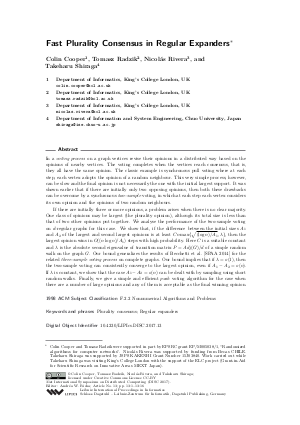Fast Plurality Consensus in Regular Expanders
Authors Colin Cooper, Tomasz Radzik, Nicolás Rivera, Takeharu Shiraga
-
Part of:
Volume:
31st International Symposium on Distributed Computing (DISC 2017)
Part of: Series: Leibniz International Proceedings in Informatics (LIPIcs)
Part of: Conference: International Symposium on Distributed Computing (DISC) - License:
 Creative Commons Attribution 3.0 Unported license
Creative Commons Attribution 3.0 Unported license
- Publication Date: 2017-10-12
File

PDF
LIPIcs.DISC.2017.13.pdf
- Filesize: 0.51 MB
- 16 pages
Document Identifiers
Subject Classification
Keywords
- Plurality consensus
- Regular expanders
Metrics
- Access Statistics
-
Total Accesses (updated on a weekly basis)
0Document
0Metadata
Abstract
In a voting process on a graph vertices revise their opinions in a distributed way based on the opinions of nearby vertices. The voting completes when the vertices reach consensus, that is, they all have the same opinion. The classic example is synchronous pull voting where at each step, each vertex adopts the opinion of a random neighbour. This very simple process, however, can be slow and the final opinion is not necessarily the one with the initial largest support. It was shown earlier that if there are initially only two opposing opinions, then both these drawbacks can be overcome by a synchronous two-sample voting, in which at each step each vertex considers its own opinion and the opinions of two random neighbours.
If there are initially three or more opinions, a problem arises when there is no clear majority. One class of opinions may be largest (the plurality opinion), although its total size is less than that of two other opinions put together. We analyse the performance of the two-sample voting on d-regular graphs for this case. We show that, if the difference between the initial sizes A_1 and A_2 of the largest and second largest opinions is at least C n max{sqrt((log n)/A_1), lambda}, then the largest opinion wins in O((n log n)/A_1) steps with high probability. Here C is a suitable constant and lambda is the absolute second eigenvalue of transition matrix P=Adj(G)/d of a simple random walk on the graph G. Our bound generalizes the results of Becchetti et al. [SPAA 2014] for the related three-sample voting process on complete graphs. Our bound implies that if lambda = o(1), then the two-sample voting can consistently converge to the largest opinion, even if A_1 - A_2 = o(n). If lambda is constant, we show that the case A_1 - A_2 = o(n) can be dealt with by sampling using short random walks. Finally, we give a simple and efficient push voting algorithm for the case when there are a number of large opinions and any of them is acceptable as the final winning opinion.
Cite As Get BibTex
Colin Cooper, Tomasz Radzik, Nicolás Rivera, and Takeharu Shiraga. Fast Plurality Consensus in Regular Expanders. In 31st International Symposium on Distributed Computing (DISC 2017). Leibniz International Proceedings in Informatics (LIPIcs), Volume 91, pp. 13:1-13:16, Schloss Dagstuhl – Leibniz-Zentrum für Informatik (2017)
https://doi.org/10.4230/LIPIcs.DISC.2017.13
BibTex
@InProceedings{cooper_et_al:LIPIcs.DISC.2017.13,
author = {Cooper, Colin and Radzik, Tomasz and Rivera, Nicol\'{a}s and Shiraga, Takeharu},
title = {{Fast Plurality Consensus in Regular Expanders}},
booktitle = {31st International Symposium on Distributed Computing (DISC 2017)},
pages = {13:1--13:16},
series = {Leibniz International Proceedings in Informatics (LIPIcs)},
ISBN = {978-3-95977-053-8},
ISSN = {1868-8969},
year = {2017},
volume = {91},
editor = {Richa, Andr\'{e}a},
publisher = {Schloss Dagstuhl -- Leibniz-Zentrum f{\"u}r Informatik},
address = {Dagstuhl, Germany},
URL = {https://drops.dagstuhl.de/entities/document/10.4230/LIPIcs.DISC.2017.13},
URN = {urn:nbn:de:0030-drops-79778},
doi = {10.4230/LIPIcs.DISC.2017.13},
annote = {Keywords: Plurality consensus, Regular expanders}
}
